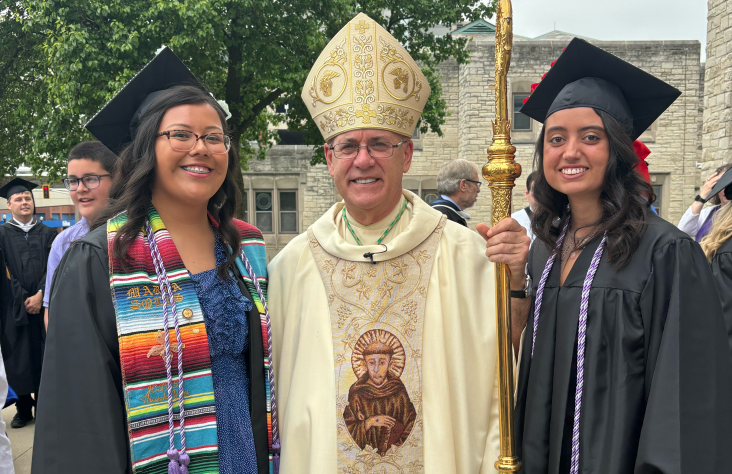March 7, 2012 // Uncategorized
Preparing for Easter sacraments
These past two Sundays, I had the joy of celebrating in both our cathedrals, the Rite of Election and the Rite of the Call to Continuing Conversion of Candidates who are preparing for Reception into the Full Communion of the Catholic Church.
The Rite of Election marked the close of the period of the catechumenate for 227 adults of our diocese who will be baptized, confirmed, and receive their first Holy Communion at the Easter Vigil. These men and women, now called “the elect,” have now begun the period of final, more intense preparation for the sacraments of initiation. They are called “the elect” because they have been chosen or elected by God. At the ceremonies these past two Sundays, their names were inscribed in the Book of the Elect.
During the Rite of Election, the godparents of the catechumens testified that they have faithfully listened to God’s word proclaimed by the Church and have responded to that word and begun to walk in God’s presence. The catechumens testified that they desired to enter fully into the life of the Church through the sacraments of Baptism, Confirmation, and the Eucharist. The assemblies gathered at our cathedrals testified that they would pray for the catechumens as we move toward Easter. It is good for all of us, during these weeks of Lent, to remember the elect in our prayers.
After the Rite of Election, we celebrated the Rite of the Call to Continuing Conversion of 275 adults of our diocese who will be received into the Full Communion of the Catholic Church. These are men and women, already baptized, who seek to be able to participate fully in the sacramental life of the Catholic Church. Their sponsors testified that they are ready to receive the sacraments of Confirmation and Holy Eucharist. And, again, the members of the assembly pledged to support these candidates in faith, prayer, and example. It is also good for all of us, during these weeks of Lent, to remember the candidates in our prayers.
As we look forward to celebrating at Easter the life-giving mysteries of our Lord’s suffering, death, and resurrection, we do so along with the 502 men and women of our diocese who will join us for the first time at the Eucharistic table of the Lord. They will join us in faith and in the sacramental sharing of the paschal mystery.
Our evangelizing mission
I have said many times in parishes throughout our diocese that a truly vibrant parish is an evangelizing community. Evangelization is the fundamental mission of the Church. We have received the missionary mandate from Jesus Himself who said: “Go therefore and make disciples of all nations, baptizing them in the name of the Father and of the Son and of the Holy Spirit, teaching them to observe all that I have commanded you; and Lo, I am with you always, until the close of the age” (Matthew 28:19-20). The Twelve Apostles were the first missionaries. The local churches they founded became missionary communities. What was done at the beginning of Christianity remains important for us today since the Church is missionary by her very nature.
When we think of the Church’s missionary activity, we naturally think of the proclamation of the Gospel in foreign lands where people have not heard about Christ or the Gospel and where the Church is not established. This is what is called the Church’s mission “ad gentes.” It can be called “a first evangelization.” Every October, we celebrate World Mission Sunday and support the Church’s missions in these areas of the world.
It is also important for us to recognize the need for our missionary activity here in the United States and in our diocese. Here most people have heard Christ proclaimed and here the Church is established. The first evangelization of America began centuries ago. Both Blessed John Paul II and Pope Benedict XVI have spoken of the need for a “new evangelization” in the Western world. It is not “new” in content, but in energy and ardour, in methods and expression. It is urgently needed especially because of the secularization process that has produced a serious crisis of the meaning of the Christian faith and of belonging to the Church. We need only think of the millions of people in our country who practice no religion, baptized Christians who have become indifferent to the faith, and the many people who have become lost in “the deserts of the secularized world.” Pope Benedict has spoken often about “the eclipse of the sense of God” in our society. Yet, every human soul thirsts for meaning and purpose in life, indeed, thirsts for the living God.
In the context of our increasingly secularized culture, we must be ever more attentive to our evangelizing mission. This begins with ourselves and our own commitment to Christ and the Gospel. In this season of Lent, we are reminded of the need for our own continual repentance and conversion, our constant need of being evangelized ourselves by constant renewal and growth in holiness. Only then can we evangelize others with credibility.
The witness of our lives as faithful disciples of the Lord Jesus has primary importance in the task of evangelization. The witness of our parishes as vibrant communities of faith, hope, and charity is what makes them true evangelizing communities. Besides our witness, there needs to be an explicit proclamation of the Gospel. We must not be afraid to speak about and share our faith and to invite others to the Church. We are to bear witness to the faith and to proclaim it. We evangelize; we do not proselytize. We propose; we do not impose. We respect other religions and the religious liberty of our neighbors. At the same time, we do not withhold from non-Christians the riches of the mystery of Christ. And, of course, we respect our brothers and sisters who are non-Catholic Christians with whom we share a common baptism. We pray and work for Christian unity. At the same time, we also bear witness to our Christian brethren of the fullness of the revelation which the Catholic Church has received and the fullness of the means of salvation which we have received from our Lord, including the seven sacraments.
As we approach Easter, we pray for the 502 people in our diocese who will become Catholic: those who will be baptized and those who will be received into the full communion of the Catholic Church. We welcome them and we rejoice with them. At the same time, looking to the future, I invite all to be even more dedicated to the mission of evangelization. We have conducted the Catholics Come Home campaign to invite our non-practicing brothers and sisters to return to the practice of the faith. We must continue to reach out to them. And we must be even more ardent in our mission of evangelization to the unchurched. May the Lord bless us with spiritual fervor as we proclaim and bear witness to Him with joy and with love! May Mary, the Star of Evangelization, intercede for us in this holy mission!
The best news. Delivered to your inbox.
Subscribe to our mailing list today.





